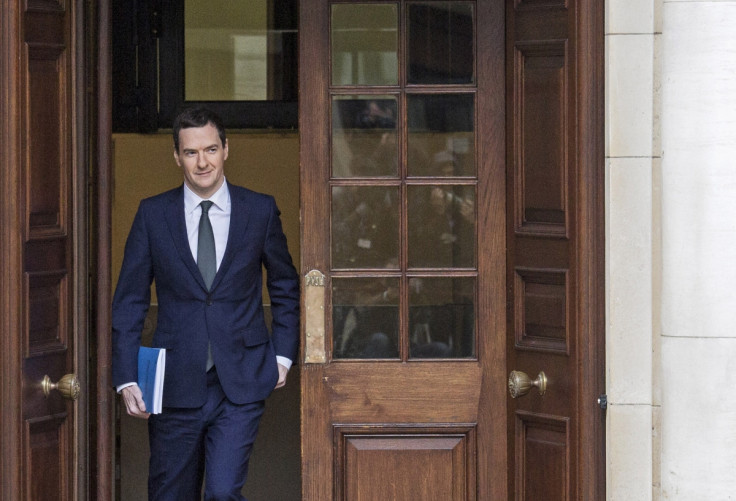Autumn Statement 2015: George Osborne's wooing of the grey vote masks a pension time bomb

In the midst of the Autumn Statement today, in between Chancellor George Osborne's very welcome U-turn on tax credits and the announcement that the police budget won't be cut after all, was a little nugget on pensions – which will see the biggest rise in 15 years.
It's hardly a surprise, though. Osborne's political mantra has always been to keep pensioners happy. Some of that has been for the better. It's right to let people do what they want with their savings, rather than forcing them to buy an annuity.
But the overall picture is not good. As spending has – necessarily – fallen, the pensions bill has risen and risen and risen. The "triple lock" means that the state pension will always rise either by the inflation rate, the rate of earnings growth, or 2.5%, whichever is highest.
There are millions of young would-be immigrants who would be happy to come here and pay for granny's retirement – compared to actually cutting pensions, that may be the path of least resistance
Over time, this would scarcely be affordable under the best circumstances. But Britain is getting older. By 2040 the number of pensioners as a percentage of the working age population will have risen from today's 30% to 37%. And we're living longer. The average retiree at 65 is expected to live for another 21 years (men) or 24 years (women) a figure that is set to rise to 25 and 27 years respectively by 2040.
More pressingly in the short run, inflation is near zero, so the state pension has to rise by a minimum of 2.5% in real terms every year. If the chancellor hoped that inflation might give him a way out of shovelling more and more money into pensions, he was wrong. As Fraser Nelson pointed out earlier, pensioner households now get nearly as much as working age households do, on average.
All this is probably not keeping the chancellor up at night. The Conservatives have the grey vote pretty well sewn up, winning 47% of the over-65s vote compared to 23% for Labour in May, and pensioner turnout is very high – 78% in 2015, versus a rate of 43% for 18-24 year olds.
It's sometimes said that a government that robs Peter to pay Paul can always count on Paul's support. Actually, that's probably not true: most of the evidence around voting behavior suggests that Paul and Peter are both quite civic-minded, and when they and other people go to the voting booth they're trying to elect whichever party is best for the country, not just themselves.
In studies of American congressional elections, the national economic situation is a very good predictor of how people will vote; a voter's personal situation is a very poor predictor. People blame the government for the state of the economy, but themselves – or their bosses – for the state of their own wallets. European voters appear to act in the same way.
But there are exceptions to this rule. High information voters who are engaged with politics – notable by their higher turnout rates, for example – are actually relatively selfish, voting for whichever party can make them richest. These are the voters who know enough about politics to make a connection between government policy and the price of their house, say, or the level of their benefits. They may also realise that governments have less power over the state of the economy than most voters imagine, so see less downside in voting selfishly.
This might help to explain why government giveaways always seem to focus on relatively small, well-heeled parts of middle England and to pensioners – there just isn't any electoral benefit in giving away to poorer groups. Not only do they vote in droves, unlike many other groups of voters they will actually reward you at the ballot box for giving them more stuff.
The £3 increase to the state pension may sound quite small. But it adds up. The triple lock has added an extra £6bn a year to the £70bn we spend on pensions, according to a subsequently-buried report from the Government Actuary's Department last month, with pensioners being given £500 more than if the pension had been tied to earnings alone.
People like to predict doom about the pensions system: we're getting older and a pay-as-you-go system isn't sustainable. To some extent that's reasonable, but there are millions of young would-be immigrants who would be happy to come here and pay for granny's retirement – compared to actually cutting pensions, that may be the path of least resistance.
And in the long run – twenty, thirty years in the future – we may not end up with a state pension at all, but mandatory private schemes as in Chile. Auto-enrollment is the first step towards that, but it is a very long road, because you have to cover everyone who has not had forty-five years to build up their own pot.
Navigating that long road is the problem we face now, and the triple-lock is the first thing that needs to go. The Conservatives like to boast about taking on a country on the brink of bankruptcy and getting its spending under control. Even if it costs them votes, they have at least one thing left to grapple with.
© Copyright IBTimes 2025. All rights reserved.






















